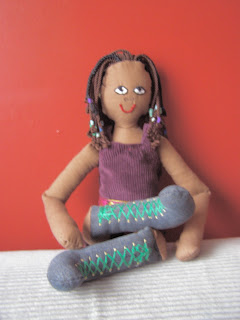My first attempt at a proper post in about a month...This is a kind of
Bare Bones of Equality post. During my recent brain-plummet I read
this post at Screw Bronze! Elizabeth writes,
"Which gets me to my question, what use am I as a human being? Why should anyone come to help me eat, or help me to the bathroom, or help me to bed when I can’t move? Why should I be taken care of? What purpose do I serve in our national and social framework? The plain fact is that I am not well loved by many people: my family whether immediate or extended isn’t interested in assuming the burden. The reality is that care isn’t coming from family. So it falls to society. And I, as a rational member of society (albeit only barely rational in this level of pain) don’t see the gain."
Finding myself to be rather less active and productive than Elizabeth, I decided to climb into the compost bin so that at least my decomposing corpse could nourish the plants. Only [...] pointed out that it would take
ages, it would smell really bad and in the meantime, he'd have nowhere to put the old teabags.
In any case, I do know some of the answers. Of course, what we
know doesn't always hold sway over what we
feel, especially when we're in great pain and/ or feeling particularly frustrated by our limitations, and I've felt, said and written this sort of thing often enough. I want to emphasise that I'm not criticising Elizabeth for writing such things. However:
The founding assertion of egalitarianism is that
every human being is of equal value. From this, it follows that everyone should be given equal opportunities in life and equal respect.
Like all fundamental moral tenants this (a) demands lots of qualification and (b) goes against a small but significant part of our human nature. Naturally, I consider my friends and family much more important than anyone else in the entire world. Most of us are, to some extent, attracted to convenient groupings and hierarchies. But as with our murderous inclinations, we must not bring these feelings into the way we behave in society. We don't have to send
everyone a Christmas card, but we do have to give everyone the same chances in life - and indeed
for life.
In fact, the only issue about my
life which can be called into question is its viability, rather than its value. There are often rumblings along the lines that disabled people can only possibly be seen as equal when a society is affluent enough to indulge us. This isn't true; our value does not change. However, if two of us catch deadly Umbungo Disease and there's only one dose of cure, then the chances are that the best possible outcome (a life saved) can be achieved by giving the dose to the other person. If I am on a sinking ship with a shortfall of life-jackets, well someone else probably has a better chance of staying alive and swimming to safety than me. Morbid, but extremely unlikely events.
Those who disagree are often drawn to even less likely
Desert Island scenarios. If I am one of a party stranded on a desert island with very limited resources, then I am going to be much less useful than everyone else. I will make no contribution. Worse, I will actually
take resources from other people. The best possible outcome is only achieved if I am strangled and roasted for dinner (although cook me
very thoroughly or you might catch something).
In fact, perhaps I
could be very useful; the first thing I could do is seize the conch and solve tricky moral dilemmas like this one, reassuring my companions that I should be kept alive - advice I'm sure they'd all appreciate. But why?
This is not about
sanctity of life. Capital Punishment is an absolutely ludicrous idea in a society that can well afford to imprison people for life, but on our desert island it would be impossible to secure a person who poses a threat to the rest of us, so they'd need taking out. Their existence effectively becomes
inviable.

Nor is this isn't about arguing that whilst I cannot contribute physically, I may be able help put imminent starvation and death into perspective with daily poetry-readings. It doesn't matter if I can play no useful role at all. I remain of value because I am a human being. This doesn't mean that people should abandon raft-building and start constructing ramps so I can get about all over the island; even the most modern disability law, adjustment made to enable people with impairments to access the world must be qualified as
reasonable given the circumstances and the resources available.
The alternative isn't a situation where we settle into some sort of "natural" hierarchy with those who are most useful at the top and those who are apparently useless being left by the wayside*. The alternative is a perpetual and bitter argument in which everyone attempts to argue for their own indispensability. Not only is the usefulness of an individual quite impossible to measure, but it is constantly changing and inextricably connected to the activities of other people.
Let's float our rudimentary raft away from that accursed island and back to the real world. In terms of contribution weighed against consumption, living in the West just now poses a small problem for everyone, and ecologically, the very richest people use the most resources. But we were talking about individuals within single societies as opposed to geopolitics, weren't we?
Let's take someone useful - a doctor, perhaps? A medical doctor is always useful, right? I wouldn't argue with that. However, even their usefulness is subject to variation. In the absence of technology, medicines and other resources, a doctor's powers to heal are very limited indeed. Then again, in a society where everyone enjoys good hygiene, nutrition, safe living and working conditions, a doctor's usefulness is somewhat less than it would be, say, in a war zone.
Also, in order to be as useful as possible, a doctor also depends on several other roles to be fulfilled. People who organise paperwork, who make appointments and so on. Nurses who perform less expert but no less essential roles (that's the theory). People who keep things clean. Then everyone who helps to provide equipment, medicine and so on and probably half a dozen other roles I haven't thought of. All very important, very useful.
So the reason doctors are so useful is that they can save lives and improve quality of life. Teachers don't directly save lives, they do the quality of life thing, but that's a little more complicated. What about lawyers? Or accountants? People who work in telesales? The prime-minister? The Beckhams?
And how do these roles - which people are paid to do - compare with those roles which people are not paid to do. How does a fire-fighter rate against an excellent parent? How many of us feel we owe our happiness, sanity or even our lives to our friends? Might it actually be the case that lots and lots of people are far more use outside of the thing they get paid for?
Nobody is without a role. Even the most severely impaired person plays some role in the lives of others; should we suppose that this is negative? That anyone truly takes more than they give? Economically, they may - I
do, and because of the stage of life that I happened to get sick, I
always have**. However, I do help support the existence of others; I am a patient, a client, a customer. People like me provide
a convenient scapegoat 
for an incompetent and corrupt government. And then there are all the other things I do for people which matter terribly to me but are kind of irrelevant, being conditional on how sick I happen to be.
Now, all this doesn't mean we don't have responsibilities towards one another, and that we shouldn't all aspire to live a virtuous life and all that. Only our value cannot be diminished by involuntary limitations on what we are
able to do.
That having said, it's bloody frustrating and changing levels of dependence and loss of self-sufficiency are a rock solid
git to come to terms with. So everyone is allowed to feel like a waste of space from time to time.
The other day, Fluttertongue referred back to a post she wrote about
being "done to" which offers a spiritual perspective to the frustrations of inactivity and is well worth a read.
* When something is
by the wayside, well surely the
wayside is at the side of the way already? I lose sleep thinking about that sort of thing.
** None of us should be ashamed of this because, as I've said before, it is a universal insurance policy from which everybody has an equal right to claim should they find themselves in need. Medical, practical and financial assistance is provided for us as it would be provided for the most economically productive person should they have a nasty accident tomorrow (which might well happen). It is the (bad) luck of the draw who finds themselves in this position, however much they have paid into the system through tax. Meanwhile whilst voluntary and family carers get a very raw deal, most are making a choice; care provided by the state is unequivocally consensual and indeed, renumerating. People who do this work deserve respect and appreciation, but
this is not charity.
 Christmas was mostly very good, thank you. My cake was a great success, so far as I can tell. Rather, uh, moist, but that was to be expected. Some of it has travelled as far as Snowdonia, would you believe? I saw Alexander on Boxing Day and it seemed that he was having a lovely time, even if he did get enough toys to furnish a large kindergarten. His favourite present had been a baby-baby-grand, so to speak, which he played all Christmas Day and then returned to, stark naked, after his evening bath.
Christmas was mostly very good, thank you. My cake was a great success, so far as I can tell. Rather, uh, moist, but that was to be expected. Some of it has travelled as far as Snowdonia, would you believe? I saw Alexander on Boxing Day and it seemed that he was having a lovely time, even if he did get enough toys to furnish a large kindergarten. His favourite present had been a baby-baby-grand, so to speak, which he played all Christmas Day and then returned to, stark naked, after his evening bath. I gave him a stool which I had decorated and painted and a doll I made. He responded well to the stool in so far as he immediately understood that it was something to sit on. The doll is called Petal the Pirate (to be friends with Kettle - Petal doesn't look much like a pirate, I know but she is one because I said so). I wrapped Petal up such that she could still see out of the wrapping paper and as soon as Alexander spotted her eyes, he tore off the paper, pulled her out and gave her a big hug. He then ran off with her and came back empty handed. I later found her sat in a pair of slippers; I'm not quite sure what that means.
I gave him a stool which I had decorated and painted and a doll I made. He responded well to the stool in so far as he immediately understood that it was something to sit on. The doll is called Petal the Pirate (to be friends with Kettle - Petal doesn't look much like a pirate, I know but she is one because I said so). I wrapped Petal up such that she could still see out of the wrapping paper and as soon as Alexander spotted her eyes, he tore off the paper, pulled her out and gave her a big hug. He then ran off with her and came back empty handed. I later found her sat in a pair of slippers; I'm not quite sure what that means.


 for an incompetent and corrupt government. And then there are all the other things I do for people which matter terribly to me but are kind of irrelevant, being conditional on how sick I happen to be.
for an incompetent and corrupt government. And then there are all the other things I do for people which matter terribly to me but are kind of irrelevant, being conditional on how sick I happen to be.